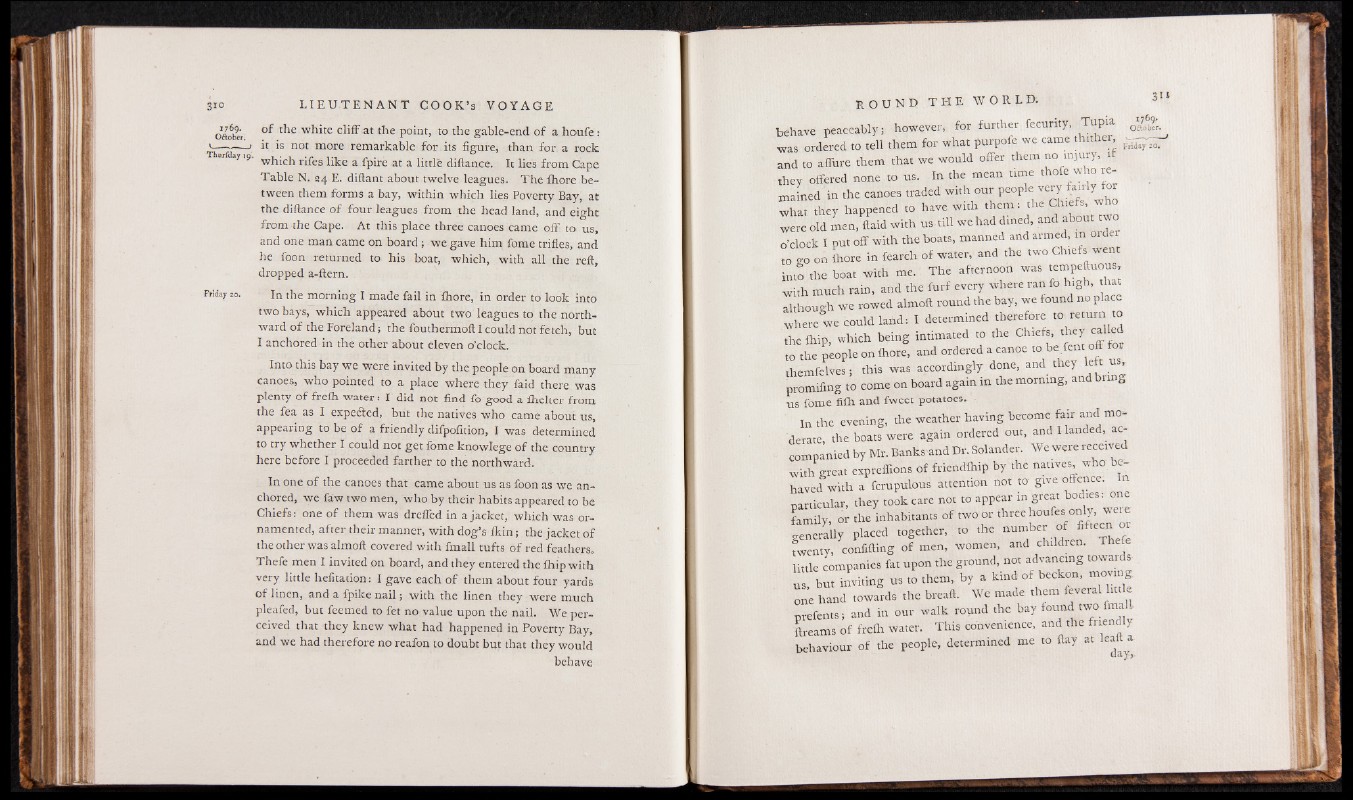
1769.
Oftober.
Thurfday 19
Friday 20.
M
of the white cliff at the point, to the gable-end of a houfe:
it is not more remarkable for its figure, than for a rock
which rifes like a fpire at a little diftance. It lies from Cape
Table N. 34 E. diftant about twelve leagues. The fhore between
them forms a bay, within which lies Poverty Bay, at
the diftance of four leagues from the head land, and eight
from the Cape. At this place three canoes came off to us,
and one man came on board ; we gave him fome trifles, and
he foon returned to his boat, which, with all the reft,
dropped a-ftern.
In the morning I made fail in fhore, in order to look into
two bays, which appeared about two leagues to the northward
of the Foreland; the fouthermoft I could not fetch, but
I anchored in the other about eleven o’clock.
Into this bay we were invited by the people on board many
canoes, who pointed to a place where they faid there was
plenty of frefh water: I did not find fo good a fhelter from
the fea as I expedtcd, but the natives who came about us,
appearing to be of a friendly difpofition, I was determined
to try whether I could not get fome knowlege of the country
here before I proceeded farther to the northward.
In one of the canoes that came about us as foon as we anchored,
we faw two men, who by their habits appeared to be
Chiefs: one of them was drefled in a jacket, which was ornamented,
after their manner, with dog’s fkin; the jacket o f
the other was almoft covered with fmall tufts of red feathers.
Thefe men I invited on board, and they entered the fhip with
very little hefitation: I gave each of them about four yards
of linen, and a fpike nail; with the linen they were much
pleafed, but feemed to fet no value upon the nail. We perceived
that they knew what had happened in Poverty Bay,
and we had therefore no reafon to doubt but that they would
behave
behave peaceably; however, for further fecurity, Tupia ■
was ordered to tell them for what purpofe we came thither ^ ^
and to affine them that we would offer them no injury, if
they offered none to us. In the mean time thofe who remained
in the canoes traded with our people very fanly for
what they happened to have with them: the Chiefs, who
were old men, ftaid with u s ,ill we had dined, and about two
o’clock I put off with the boats, manned and armed, in orde
to go on Lore in fearch of water, and the two Chiefs went
into the boat with me. The afternoon was tempcftuous,
with much rain, and the furf every where ran fo high, that
although we rowed almoft round the bay, we found no place
where we could land: I determined therefore to return to
the fhip, which being intimated to the Chiefs, they cal ed
to the people on fhore, and ordered a canoe m b e h n to ff for
themfelves; this was accordingly done, and t ey e >
promifing to come on board again in the morning, an ring
us fome fifh and fweet potatoes.
In the evening, the weather having become fair and moderate,
the boats were again ordered out, and I lande , accompanied
by Mr. Banks and Dr. Solander. We were received
with great expreffions of friendfhip by the natives who behaved
with a fcrupulous attention not to give offence. In
particular, they took care not to appear in great bodies, o
family, or the inhabitants of two or three houfe*' ™
generally placed together, to the numbe o fiftecn or
twenty, confifting of men, women, and childJn. Thefe
little companies fat upon the ground, not advancing towards
us but inviting us to them, by a kind of beckon, moving
one hand towards the breaft. We made them feveral little
prefents; and in our walk round the bay foundl two fma
ftreams of frefh water. This convenience, and the friendly
behaviour of the people, determined me to flay at leaf! a